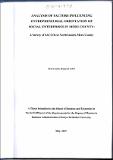| dc.description.abstract | Although entrepreneurship has been studied for thousands of years, social entrepreneurship which considers the practice in which an entrepreneur sets out to solve some social problem by way of combining business management skills with social sector acumen to yield a sustainable enterprise that produces both financial and social returns is quite a challenging area. The main objective of this study was to analyse entrepreneurial orientation among the managers of SACCOs in North Imenti, Meru County. As there are limited studies about Entrepreneurial Orientation in Kenya, this study was expected to contribute significantly to the development of this field. This study was anchored on existing theories in Entrepreneurship namely Psychological Entrepreneurship Theories, Sociological Entrepreneurship Theory, Schumpeter's' Innovation Theory, Entrepreneurial Orientation at the firm Level and Entrepreneurial Orientation at the individual Level based on which the. conceptual framework was derived. A descriptive research design was adopted in conducting this study. Primary data was collected using closed - ended questionnaires. Multiple Logistic Regression analysis was used to analyse data; show the relationship between independent variables (Innovation, Risk-taking, Autonomy, Proactiveness and Aggressiveness) and the dependent variable (Entrepreneurial Orientation); and to test the hypotheses, the researcher used 95% confidence level. Secondary data was collected from higher learning institutional journals. This study ensured all ethical considerations such as confidentiality were highly maintained The total population in the survey was 35 respondents which comprised of managers, in charge of the SACCO's. This research employed census survey, which means all the 35 managers from the 35 SACCOs in Imenti North were respondents for the study. Census survey was appropriate because the total population was small and easily accessible. One of the greatest advantages of a census survey is that all employees have the same opportunity to participate. A census survey tends to enhance feelings of security surrounding the accuracy of the results. Finally, census survey is easier to administer because it includes all persons. Descriptive statistics was used in analysis of data in SPSS (version 20) using Multiple Logistic Regression model to link the relationship between independent variables and dependent variable and to test the hypothesis at 95% confidence level. Descriptive data is summarised and presented in form of frequency tables and percentages. The findings revealed that Innovation, Risk-taking, Autonomy and Proactiveness were the only factors which had significant influence on the entrepreneurial orientation of the managers whereas competitive aggressiveness had insignificant influence. Therefore entrepreneurial acumen and business management skills be classified as the strongest predictors of survival of firms. Hence, the ability to adjust one's business model to adapt to changed economic circumstances is an important characteristic of entrepreneurial conduct that ultimately dictates survival in increasingly competitive economic environments. Therefore, management should understand the importance of these dimensions of the EO which refers to the top management's strategy in relation to innovativeness, proactiveness and risk-taking for the sustainability of the SACCO's as forms of social enterprises. | en_US |

